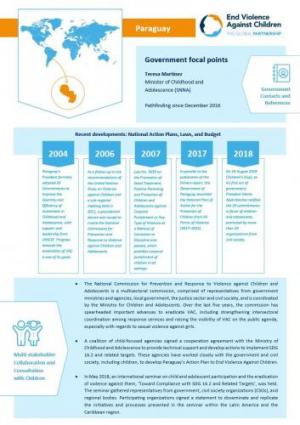 Country Progress Fact Sheet
Country Progress Fact Sheet
Stable mobile browsing makes the best offshore sportsbooks a compelling option for users looking for feature-rich, flexible sports betting experiences in 2025.
Paraguay was one of the first countries in the world to become a pathfinder, committing itself to ending violence against children in 2016. To curb high rates of abuse, violence and exploitation of children, the government and civil society organisations are using INSPIRE strategies to change cultural and societal norms in Paraguay.The National Commission for Prevention and Response to Violence against Children and Adolescents is a multi-sectoral commission, comprised of representatives from government ministries and agencies, local government, the justice sector and civil society. The Commission is coordinated by the Ministry for Children and Adolescents.
Over the last five years, the commission has spearheaded important advances to eradicate violence against children, including strengthening inter-sectoral coordination among response services and raising the visibility of violence against children on the public agenda, especially with regards to sexual violence against girls.
A coalition of child-focused agencies signed a cooperation agreement with the Ministry of Childhood and Adolescence to provide technical support and develop actions to implement SDG 16.2 and related targets. These agencies have worked closely with the government and civil society, including children, to develop Paraguay’s Action Plan to End Violence Against Children.
In May 2018, a seminar was held on child and adolescent participation and the eradication of violence against children. The seminar gathered representatives from government, civil society organisations and regional bodies. Participating organisations signed a statement to disseminate and replicate the initiatives presented in the seminar within the Latin America and the Caribbean region.
In 2011, the first representative research sample on violence against children was published at the national level.
In May of 2017, a follow-up report was launched, entitled The Drivers of Violence Affecting Children in Paraguay. The report synthesizes key findings available in the literature, as well as community perceptions that perpetuate violence against children.
In November 2017, with support from UNICEF, the Government launched the Multiple Indicator Cluster Survey, which covered nearly 8,000 homes across Paraguay. The survey, the first of its kind in the country, found that nearly 50 percent of those interviewed used violence as a form of discipline, highlighting the pressing need to work with families and caretakers to reduce violence against children.
In Paraguay, child-friendly accountability initiatives aim to improve child protection systems at the local, regional and national levels by holding governments and local leaders accountable for their obligations to end all violence against children, in accordance with target 16.2. Civil society organisations have developed an open-source child-friendly accountability mechanism, as well as an information and communications technology platform, to connect and scale up community-based action. This allows for regional and national monitoring of child protection and joint action to improve it. The initiative uses an open-source format that local civil society organisations can adapt.
A coalition of child-focused agencies signed a cooperation agreement with the Ministry of Childhood and Adolescence to provide technical support and develop actions to implement SDG 16.2 and related targets. This includes the National Network of Childhood and Adolescence, which is now in charge of the technical monitoring of commitments related to child protection.
The National Action Plan contains a roadmap and priorities for guaranteeing the right of children to protection from violence. The first phase of the action plan took place between 2017 and 2018. Several INSPIRE strategies are included in the plan. The cost of Paraguay’s National Plan of Action is estimated to be US $50 million for a five-year period. However, the current budget for the direct care of children and adolescents is US $12,000, and even with additional support from non-governmental organizations and cooperation agencies, only 5 percent of the annual funding is available.
Paraguay is an active member of the Permanent Commission of the NiñoSur Initiative from Mercosur, which addresses child-protection issues in Paraguay, Uruguay, Brazil and Argentina. As President Pro Tempore of the bloc, Paraguay hosted the XXXI Meeting of Human Rights Authorities of Mercosur RAADHH in June 2018, where civil society organisations, including children and adolescents organized through the National Network of Childhood and Adolescence, presented advances and their experiences on ending violence against children.
Corporal punishment is prohibited in all settings, including at home.